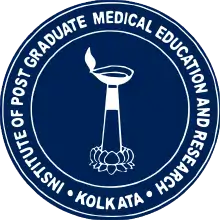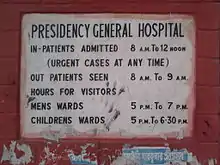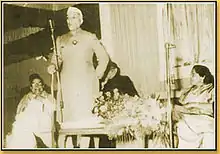IPGMER and SSKM Hospital
IPGMER and SSKM Hospital, or in its full name Institute of Post-Graduate Medical Education and Research and Seth Sukhlal Karnani Memorial Hospital, colloquially known as P. G. Hospital (Presidency General Hospital), also known as PGI KOLKATA, is a government medical school and tertiary referral government hospital for the state of West Bengal, India and is a national research institute. It is currently the best super-speciality hospital and medical college in West Bengal.
 | |
| Motto | Thirst for Knowledge, Heartfelt for Ailing |
|---|---|
| Type | Public |
| Established | 1707 |
| Director | Manimoy Bandopadhyay[1] |
| Students | Totals:
|
| Location | 22°32′20.39″N 88°20′27.27″E |
| Campus | Urban, 34 acres (0.14 km2) |
| Affiliations | West Bengal University of Health Sciences |
| Website | www.ipgmer.gov.in |

Located near Race Course ground and the Victoria Memorial Hall of Kolkata, its location is in the heart of Kolkata surrounded by cultural and historical landmarks like the Nandan complex, Rabindra Sadan, Academy of Fine Arts the Saint Paul's Cathedral, the Red Road and the Indian Museum. It faces the Maidan of Kolkata - a hot-spot for political rallies in the city. The Bangur Institute of Neurosciences is adjacent and functionally attached to this institution.
Institute of Psychiatry - Centre of excellence is also associated with IPGME&R and SSKM hospital.
History
The first hospital in Calcutta was built in the premises of the Old Fort at Gerstein Place in 1707. The Council of Fort William constructed this hospital. Initially built for the Europeans till 1770, this hospital was then known as the Presidency Hospital, after the Presidency of Calcutta and due to its proximity to the Presidency Jail of Calcutta. Later it came to be known as the Presidency General Hospital or P.G. Hospital for short - the name which is still commonly used. In independent India, the hospital was renamed as Seth Sukhlal Karnani Memorial Hospital in 1954 after great philanthropist of Calcutta, Sukhlal Karnani.[2]
P.G. Hospital was established in 1770.[2] The East India Company (Calcutta Council) purchased the plot of land, which was a gardenhouse (in 1768) from Rev. John Zacharias Kiernander at a cost of Rs. 98900.00 along with an adjoining plot belonging to a Bengali gentleman.[3]
Rev. John Zacharias Kiernander came to Bengal from Southern India in 1758 to work as the first Protestant missionary in Calcutta. The well known Old Mission Church (Bath Tephillah -'the House of Prayer'), built by him was the earliest favourite place of Protestant worship in Mission Row at his own expense at a cost of Rs. 65,000 and established a mission school in the rear of the Church in 1767. The Presidency General Hospital was established near the St. John's Church (presently, in 1, Garstin Place and in its adjoining areas) which was in famous as a hellish side.
According to Mrs. Bleshinden, "It was a veritable death-trap to those unfortunate who were driven to seek its shelter and had been the subject of constant complaint for years. At last in 1768. a house was purchased from a native gentleman for the purpose of a hospital. It stood to the south of the Maidan, practically in the country. This house with various alterations and additions, including two other buildings created in 1795 remained in us as the Presidency General Hospital".
The construction of the hospital started after the Government occupied the land on 20 June 1769. The west wing was completed on 2 April 1770 and the east wing on 2 June 1770. Admission of the patients started on 22 April 1770.

The present Main Block was constructed between 1901–1902, the Woodburn Block, Administrative Building and Physiotherapy Building were built between 1902–1908. For construction of Woodburn block, total expense was Rs. 3.5 Lacs.
This hospital is the oldest general hospital in India, for the practice of modern medicine and for meaningful research.
It is mentioned in the book "The handbook of travellers in India, Pakistan, Nepal, Bangladesh & Sri Lanka" by L. F. Rushbrook Williams that, "On the Lower Circular Road, South of Victoria Memorial is the Presidency General Hospital (1768), formerly intended for Europeans. In its place The European business community has established a well found clinic of his own. The Station military hospital, conspicuous by its pillared frontage was (1773) the court house of Sardar Dewani Adalat, the Chief Provincial Court of Appeal which ceased to exist on the establishment of High Court in 1862".[4] From this record, it is quite evident that PG Hospital is a part, of world heritage, I am thankful to Calcutta Municipal Corporation and the Govt. of West. Bengal for declaring heritage status to this institution in response to my appeal dated 16.1.1998.[5]
This hospital has a glorious record of fundamental research in Medicine. Drs. Edward Hare, D.D. Cunnigham, Ronald Ross, T. H. Lewis, Ronald Martin did put their mark in medical treatment and research.
Sir Ronald Ross made his epoch-making-discovery of "Cycle of Malarial Parasite" in this hospital and was awarded Nobel Prize in Medicine and Physiology on 10 Dec 1902.[6] He also received the Barkley Bronze Memorial Medal from Asiatic Society, Calcutta on 20 May 1903, Sir Ronald Ross is the first Indian (born at Almorah) Nobel laureate. After his retirement from service on 31 July 1899, he visited PG Hospital in January 1927, when the "Gate of Commemoration" bearing his statue and poem in the plaque was unveiled by Lord Lytton.
Michael Madhusudan Dutta was the first native Indian to be admitted to this hospital on 22 June 1873 and here he died on 29 June 1873.
Dr. Surendranath Ghosh was the first native Indian doctor to be appointed in PG Hospital.[7] The first floor of the Woodburn Block was renamed as Dr. S. N. Ghosh Ward, by the then Chief minister Hon'ble Jyoti Basu following the publication of the article in PG Bulletin, along with a photograph of Dr. Ghosh and facsimile of his diary page. The first Indian doctor of the hospital has been bestowed with honour.

P.G. Hospital was the first Post Graduate Medical Institute in Eastern India in 1957 when it hospital came to be known as The Institute of Post Graduate Medical Education & Research (IPGMER). It was inaugurated by Pandit Jawahar Lal Nehru, the then Prime Minister of India, on 16 January 1957.
Undergraduate medical training started here rather late in 2004 after clearance from the Medical Council Of India (MCI).
The erstwhile Chief minister, Hon'ble Jyoti Basu had pledged his body to the advancement of medical science. After his demise, honoring his wishes, his body was handed over to the college authorities. This move has triggered a wave of body donations in the state.[8]
Layout
One end of the premises contains various outpatient departments, wards and clinics, while the other comprises the administrative and college buildings for medical and paramedical students. The wards include Curzon, Victoria, Alexander, etc. in the Main block, the O&G blocks. Other services are the out patient departments and wards of Chest, Cancer, Nephrology, etc. The teaching buildings include the UCM, Ronald Ross, Psychiatry building, Old Emergency Building, housing lecture theaters, museums and laboratories.
Academic building is in the heart of hospital campus. It was established in 2014.
The medical college Library is situated in the seventh floor. There are two separate sections of library for the UG and PG students.
HOSTEL FACILITY:
There are three hostels for undergraduates and one hostel for postgraduate students, all inside the college campus.
There are separate boys' and girls' hostels. A newly constructed boys hostel named NEW MBBS BOYS HOSTEL is inside the PG campus and one UG hostel named MAIN HOSTEL is inside the college campus. A newly constructed UG girls' hostel is adjacent to the Academic building .
Hostels are very clean and well-maintained. Top Floor of each Hostel provides good view to Victoria Memorial and surrounding posh areas. Each hostel has its own canteen, plus there are several extra canteens inside campus too.
The cultural fest of IPGME&R and SSKM Hospital is CRUX which is held annually around August–September.
Affiliation and administration
It is currently affiliated to the West Bengal University of Health Sciences. From 1857 to 2003, it was affiliated with the historic University of Calcutta. It is funded and run jointly by the state and central governments of India.
As of 24 August 2019:
- Director: Prof Manimoy Banerjee, MBBS, MS (Anatomy)
- MSVP: Prof. Raghunath Mishra, MBBS, MD (Preventive and Social Medicine)
- Dean of Student Affairs: Prof. Abhijit Hazra, MBBS, MD (Pharmacology)
- Deputy Superintendent: Dr. Atindra Nath Mondal
- Head of Department- Internal Medicine: Prof. Soumitro Ghosh
- Head of Department- Obstetrics and Gynecology: Prof. P.S. Chakraborti
- Head of Department- Cardiology: Prof. D. Mukherjee
- Head of Department- Neurology: Prof. G. Ganguly
- Head of Department- Endocrinology: Prof. Subhankar Chowdhury
- Head of Department- General Surgery: Prof. Makhan Lal Saha
Departments
- Anaesthesiology
- Anatomy
- Biochemistry
- Cardiovascular Sciences (Cardiac Division)
- Cardiovascular Sciences (Cardiothoracic & Vascular Surgery)
- Dentistry
- Dermatology
- Emergency
- Endocrinology
- ENT/Oto-Rhino-Laryngology
- Forensic Medicine
- Gastroenterology
- Medicine
- Microbiology
- Neonatology
- Nephrology
- Neuro-anaesthesiology
- Neuromedicine
- Neurosurgery
- Nuclear & Experimental Medical Sciences
- Obstetrics & Gynaecology
- Ophthalmology
- Orthopaedic Surgery
- Pathology
- Paediatric Medicine
- Paediatric Surgery
- Pharmacology
- Physical Medicine and Rehabilitation
- Physiology
- Plastic Surgery
- Preventive and Social Medicine
- Psychiatry
- Radiodiagnosis
- Radiotherapy
- Respiratory Medicine
- Surgery
- Urology
Rankings
| University and college rankings | |
|---|---|
| Medical – India | |
| The Week (2019)[10] | 17 |
IPGMER was ranked 17th among medical colleges in India in 2019 by The Week.[10]
See also
References
- "Director".
- "IPGMER SSKM Hospital". Archived from the original on 9 June 2012. Retrieved 18 October 2012.
- Consultations, 26 April 1768
- L. F. Rushbrook Williams, The handbook of travellers in India, Pakistan, Nepal, Bangladesh & Sri Lanka
- List of Premises that the CMC intends to include in the heritage list in terms of section 425B of CMC Act, 1980 (Amended) SI. No. 706, Page 90, Ward 70, Borough 8.
- Ronald Ross - Biography
- Prof, Subrata Sen, "Presidency General Hospital -Early Years" PG Bulletin (Vol. I. 16 January 1996)
- "Archived copy". Archived from the original on 15 July 2012. Retrieved 30 July 2010.CS1 maint: archived copy as title (link) Body donation wave in Bengal after Basu's deed
- "IPGMER SSKM Hospital Kolkata West Bengal India". www.ipgmer.gov.in. Retrieved 13 September 2018.
- Pushkarna, Vijaya (8 June 2019). "Best colleges: THE WEEK-Hansa Research Survey 2019". The Week.
